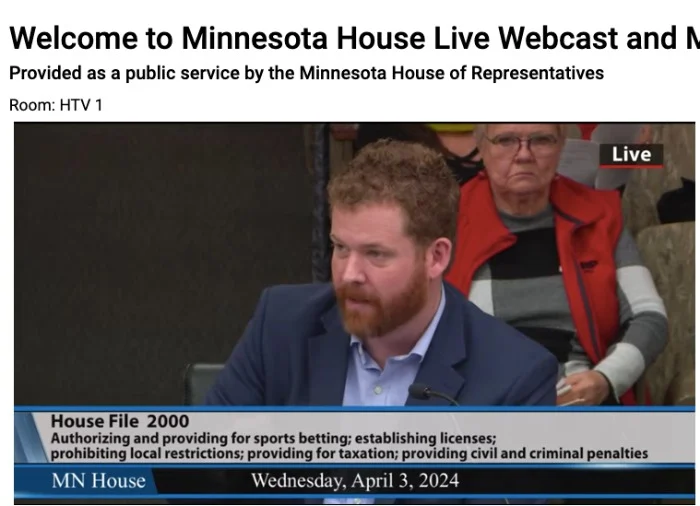Zack Stephenson (MN) brought his bill on legalized online sports betting to the House Commerce Finance and Policy Committee, 3 April. Committee members reacted with opposition.
The committee members disagreed on questions such as horse racing tracks and the best way to negotiate a contract for 11 tribal groups in California.
The bill is now in the House Taxes Committee, awaiting its vote. Stephenson is chair of the Commerce Finance and Policy Committee and he said that he would like to hold an information session with his committee about Minnesota’s wagering laws as the legislation moves forward.
Stephenson’s bill from the last session has undergone a number of changes, such as doubling tax rates and introducing daily fantasy sports regulations. Stephenson also mediated a deal that was reflected in this latest version of bill between the charitable gaming foundations of the state and the tribal nations.
The Commerce Finance and Policy Committee expressed their concern about many issues including tracks and how legal betting will be conducted on Indian land. Stephenson has made it very clear that his legislation does not and will never include historical horse racing at racetracks.
The HHR can be a deal-breaker
He responded to a question about whether HHR was a sport of chance or skill.
I’ve given very little redlines and left many things on the table to discuss, but here is one.”
The Representative Ann Neu Brindley called the 625,000 dollars earmarked to pay for purses on the two state racetracks, “pennies”.
Stephenson’s legislation would instead further extend the gaming monopoly of the tribes in the state, who have said that they will not support any bill allowing sports betting at the racetracks.
Indian Country has traditionally not supported legislation which would erode tribal exclusivity in states where Indian tribes enjoy exclusive rights.
Stephenson may have reworked his plan over the past four years but the main sticking point is likely to be how to appease the horse track owners and still allow tribes the exclusivity they desire.
Stephenson: take sovereignty seriously
Tim O’Driscoll, a member of the committee, asked if it was possible to equalize the playing fields for tribal members or dictate their partnership with commercial operators.
He expressed concern that small tribes wouldn’t benefit as much from the revenue-sharing program as larger tribes, and suggested the state pass legislation to share the revenues among tribes.
Stephenson dismissed the notion, stating that location is not important, unlike brick-and mortar gambling establishments. He said that a tribe of any scale could partner up with any operator.
Michigan is the best example. The Bay Mills Indian Community in Michigan, which is located about 350 miles from Detroit, was partnered up with DraftKings when the state legalized online sports betting. DraftKings is the second largest operator in America.
Stephenson said that, in his opinion, it’s not up to legislators to decide how and with whom tribal partners will work together. He added that they are sovereign nations with the right to make their decisions.
This is just one bill that’s moving through the legislative body. On the senate’s side, SF3803 (previously 49) passed two committees but is still stalled at State and Local Government and Veterans.
There is no deadline for the Minnesota legislative session to end before 20 May.



